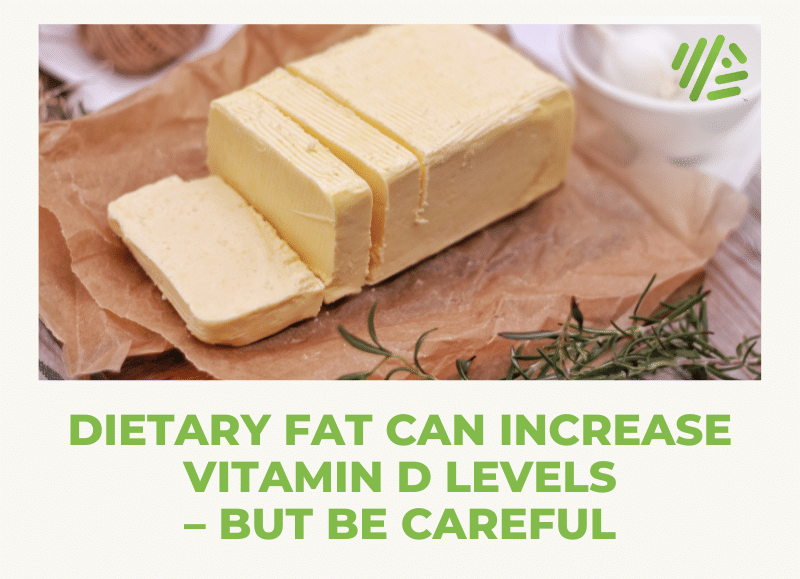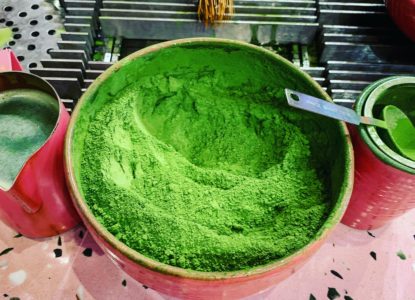Dietary Fat Can Increase Vitamin D Levels – but be Careful
Genes Mentioned

Contents
I’ve talked a bit about vitamin D previously, mainly in relation to bone health, but also briefly about potential heart issues as well.
As we will learn in this post, supplementing with vitamin D while eating a higher fat diet may help to increase vitamin D levels, but also may have an impact on short term symptoms of heart health, such as heart palpitations in some individuals.
Sun derived vitamin D vs. supplements
Vitamin D is mainly obtained through exposure to sunlight, generated by the cells of the skin, but a small amount can also be ingested through supplements.
Previous studies have shown that vitamin D synthesized in the skin is carried in the blood by a protein known as vitamin D binding protein (VDP). It was assumed that dietary or supplementary vitamin D was carried in the same fashion. However, researcher has shown ingested vitamin D is preferentially carried by various lipoproteins, allowing it to pass from the stomach into the blood supply.1
More recent work has suggested that VDP may associate with lipoproteins as well.2 Interestingly, it seems that when vitamin D alone binds with lipoproteins it is much more readily used, whereas when associated with VDP and lipoproteins it demonstrates a weaker but much longer lasting effect.1 So, for our purposes here, we see that vitamin D derived from sun exposure lasts longer in our systems than does supplemental vitamin D.
Vitamin D impact on lipids
Several studies have investigated vitamin D and blood lipids.
In 2007, a study showed a positive correlation between vitamin D and total cholesterol (when cholesterol in the blood increases, so does detected vitamin D).3 Two years later another study demonstrated that, when exposed to UV radiation, volunteers with high baselines levels of total cholesterol produced significantly more vitamin D, which is shown in the graph below.4

This graph shows that the amount of vitamin D produced after exposure to UV radiation (mimicking exposure to the sun) was greater in volunteers with a high baseline level of cholesterol.
Both of these papers focus on vitamin D production in the skin. As cholesterol is broken down into a vitamin D precursor the link is easy to see. As far as I was able to determine, there have been no studies looking at the link between a high baseline level of blood lipids (especially cholesterol) and vitamin D supplementation.
Vitamin D and heart issues
One hypothesis is that elevated blood lipids results in greater absorption of vitamin D from the gut, and carry more vitamin D generated in the skin, increasing the level of vitamin D detected in the blood.
As above, this area is covered more in depth in my previous post. To briefly summarize, vitamin D is key in regulating calcium uptake from the gut.5
Muscle relies on a steady supply of calcium ions in order to contract. In the heart this contraction results in the heartbeat; a uniform contraction of the entire muscle which pumps blood around the body. However, if too much calcium is present in the blood, excessive or irregular muscle contractions can occur; in the heart this can manifest itself as an irregular or racing heartbeat.6
Vitamin D genes
Finally to the genetic element of all this. We know there are some SNPs related to a poor lipid outcome i.e. increased LDL levels in the blood, however the exact mechanism is poorly understood and further research is required.
What we do know however is that SNPs in the vitamin D receptor (VDR) gene can lead to enhanced vitamin D activity. Several studies have shown that the shorter VDR protein, produced by the presence of the rs2228570 (FokI) ‘C’ allele is more transcriptionally active. This means that given the same levels of vitamin D someone with the short ‘C’ allele VDR protein will display increased expression of vitamin D dependent genes.78 This increased activation of vitamin D dependent genes results in a greater uptake of calcium from the intestine.910
| Protein | Gene | SNP ID (Traditional name) | Major Allele/Minor Allele (Risk) | Effect |
| Vitamin D Receptor | VDR | rs2228570 (FokI) | T/C | When carrying the C allele, VDR induces a greater effect when vitamin D binds. Resulting in increased calcium uptake |
We don’t currently know if this VDR polymorphism can be linked with heart health. Whilst there are anecdotal reports of people with various VDR gene polymorphisms reporting a racing or irregular heartbeat, there are currently no scientific reports confirming this effect.
Several studies have looked at longer term heart health in association with VDR gene polymorphisms. In a Chinese population, the rs2228570 (FokI) ‘C’ allele was associated with a reduced risk of coronary heart disease (8), although several other studies did not observe a similar protective effect.910
Bringing the hypotheses together
- Eating a higher fat diet can elevate blood lipids in some people.
- Elevated blood lipids results in greater absorption of vitamin D from the gut, and carry more vitamin D generated in the skin, increasing the level of vitamin D detected in the blood.
- Increased levels of vitamin D in the blood lead to increased calcium levels, which may induce an irregular or racing heartbeat.
- Those with a risk alleles for poor blood lipid composition, or vitamin D absorption (e.g rs2228570 ‘C‘) may be at risk of short term cardiac issues following high doses of lipids as characterized by MCT oil, Bulletproof Coffee or other fat derived supplements.
Take-home message
This is hypothesis only – however, those with the risk alleles discussed above and in previous posts may be wary of diets advocating extreme fat intakes, especially when supplementing with vitamin D.




I also ended up in the ER after taking MCT/Brain Octane oil alongwith a Vitamin D supplementation. I had palpitations and GERD like symptoms. They did a blood test and my serum calcium levels were slightly elevated. This is despite taking Vitamin K2 at the same time.
My theory is that either of two things happen: 1) MCT oil disrupts the stomach bacteria by massive kill off which results in indigestion and air/acids escaping back to esophagus which leads to palpitations/elevated heart rate. I noticed my palpitations subsided after I had a soda and was able to burp fully. Taking a probiotic/yogurt also helped.
2) An increase in Vitamin D results in underlying magnesium deficiency being uncovered and hence the headaches. Palpitations is a symptom of magnesium deficiency.
In short, I think its key to take only small doses of MCT oil (1/3 rd of advertised) and always supplement with grass fed butter and a multivitamin.
Almost had to go to the ER say 2 people in comments. Well! I did go to ER and just came out after spending the night there having blood tests, EKG’s, heart X-rays and a cat scan! My blood pressure was way over the top and my pulse very high. Was not able to sleep with the pounding in my chest and a feeling of pressure. I left the ER with prescriptions for high blood pressure medication and a Nitro spray!!
Only started on the MCT oil 5 days ago!! Of course it never occurred to me that it was the oil but since found out that my daughter had the same reaction! $50 jug of oil sitting wasted on my counter! Before using MCT I had just used coconut oil in my coffee and that was fine.
you are so right my heart rate was 159 severe abdominal pain ,nausea ,blood pressure 222/118 I almost had to be taken to the er as well scared the mess out of me also I had that oil in a big full glass of water.I still had these problems I also take a blood pressure pill that has thiazide in it and lisinopril
I take and have taken Vit D-3 , 2000 units a day for almost 10 years now and if I stop taking my doctor will check blood and I then take 10,000 units for 8 weeks, once a week. Not sure if I should stop taking VitD3. My right leg is so swollen from my hip to my ankle and I did not do this before taking MCT powder. My right hip has been very sore for a couple months now but I have not had the swelling before not taking MCT powder. I thought maybe I was sleeping too long a time on this hip. So sore when I move and taking 800 mg ibuprofen sometimes 2-3 times a day. Today my leg is very swollen and was up at 3:30 this morning because from hip to ankle was hurting so much. Not sure if i should go to doctor… or stop MCT powder…
My heart rate was 159 severe abdominal pain and nauea arms tingling headache my blood pressure went to 222/118 I almost had to go to the emergency it subside3d but scared the mess out of me .,now my pulse is usually 57/66 and if i am walking fast it is only 72 . I do not trust this any more maybe it was too much calcium but it scared me almost literally to death.
I also tried bulletproof MCT oil and had a similar reaction after taking it for about a month. I am also doing some research into the blood type diet and am wondering what blood type you are and if that affects VDR Fok1, C allele?
I am B+ and trying to figure out if I just had too much too soon or if it is a bigger issue that I should stay away from MCT.
Thanks!
Hey Joslynn. I am A+, but we’re not big believers in the blood type diet, although having said that, there is some data that tends to indicate that levels of stomach acid can be influenced by blood type, which plays a role in digestion. Post coming on that soon. Thank you for commenting and for reading!